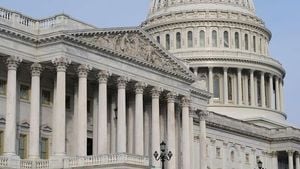Geopolitical tensions ignite anew as Colombia calls for necessary changes to international trade deals, highlighting the strain they put on national sovereignty and environmental protections. President Gustavo Petro is determined to renegotiate Colombia’s agreements with major players like the United States, the European Union, and the United Kingdom, pushing back against what his government calls the detrimental impacts of these treaties.
Recently, the Colombian government painted the effects of current trade deals as nothing short of a "bloodbath" for their sovereignty. The situation arose after President Petro observed similar instances where Western nations have sought to amend treaties when faced with corporate litigation under stringent investor-state dispute settlement (ISDS) mechanisms. This type of arbitration, which allows multinational corporations to sue governments, has proliferated since its inception in the 1950s. Initially aimed at safeguarding Western interests, these corporate courts have morphed over the decades and now often prioritize corporate profit over national regulations, environment, and public health.
Colombia's frustrations are not unfounded. Over the past decade, the country has faced 23 ISDS arbitrations, primarily initiated by foreign mining companies. One prominent case involved Glencore, which lodged multiple lawsuits against Colombia following the suspension of the expansion of the Cerrejon coal mine—situated at the heart of severe environmental debates. The Colombian Constitutional Court’s ruling was aimed at protecting local communities and ecosystems, but Glencore responded with claims of discrimination, leading to millions of dollars being awarded against Colombia.
These actions raise alarm bells for developing nations, as they often find themselves on the back foot, battling against corporate titans backed by resources and influence. Petro’s comments encapsulate the harsh realities these nations face: "We are forced to put ourselves in the mouth of the wolf."
The urgency for renegotiation grows as Colombia confronts the hypocrisy displayed by Western nations, which, having faced mounting litigation themselves, are now seeking to modify treaties—while still imposing such burdens on countries from the Global South.
A stark example is the UK's recent accession to the Comprehensive and Progressive Agreement for Trans-Pacific Partnership (CPTPP). This trade bloc, already boasting 590 million consumers—31% more than those within the EU—provides substantial economic opportunities for its members. Critics argue, though, this shift allows the UK to circumvent environmental and worker protections—similar to what Colombia fears. Former Prime Minister Liz Truss heralded this membership as securing Britain's position on the global stage, but questions loom about what protections it may forgo.
Catherine McBride OBE highlighted key advantages of the CPTPP versus EU regulations, emphasizing its avoidance of becoming another "regulatory superpower". For the UK, this accession means reduced tariffs and no punitive measures for engaging with non-member countries. Britain's successful entry significantly positions it as eager for new trade relationships post-Brexit, emphasizing Britain’s desire to pivot away from EU dependency.
Despite the seemingly positive narrative from the UK government’s perspective, concerns linger. By easing tariffs on imports, the fear resonates among British farmers and consumers alike about the influx of low-cost products from countries within the CPTPP, compromising local markets.
The protection of domestic industries still holds currency; for example, the UK maintains quotas on imported foods, such as only allowing limited beef and pork imports from CPTPP countries. Many proponents argue this mitigates risks for local agricultural producers and balances trade interests.
Back across the pond, Colombia’s goal remains pressing. The Colombian government asserts the need for its citizens and global movements, especially the trade unions within the UK, to rally support against unfair trade practices. The Colombian ambassador has explicitly stated these treaties drain resources and allow fossil fuel firms to challenge genuine climate actions being taken by sovereign governments.
Notably, Colombia isn’t alone, as other nations like Kenya, South Africa, and Ecuador have begun to retreat from ISDS mechanisms, recognizing them as tools of neocolonialism. Increasingly, calls for reform resonate beyond Latin America, signaling potential shifts toward more equitable trade frameworks.
This shifting geopolitical terrain poses more questions than answers. Will Western nations, particularly those within the European Union and the UK, align their trade practices to allow developing nations like Colombia the space to implement policies safeguarding both the environment and their people?
With both Colombia and the UK redefining their positions within the global trade ecosystem, issues surrounding sovereignty, corporate overreach, and environmental responsibility come to the fore. The outcome of these negotiations and agreements will not only shape economic futures but potentially redefine the very framework of international trade itself, beckoning nations around the world to reshape their interactions and approaches to global challenges.
The next steps will determine not only the fates of these nations but also the contours of international law and commerce. Moving forward, the dialogue must shift toward equity, sustainability, and respecting the rights of all sovereign nations, ensuring the astronomical benefits of global trade do not come at the expense of the most vulnerable.



